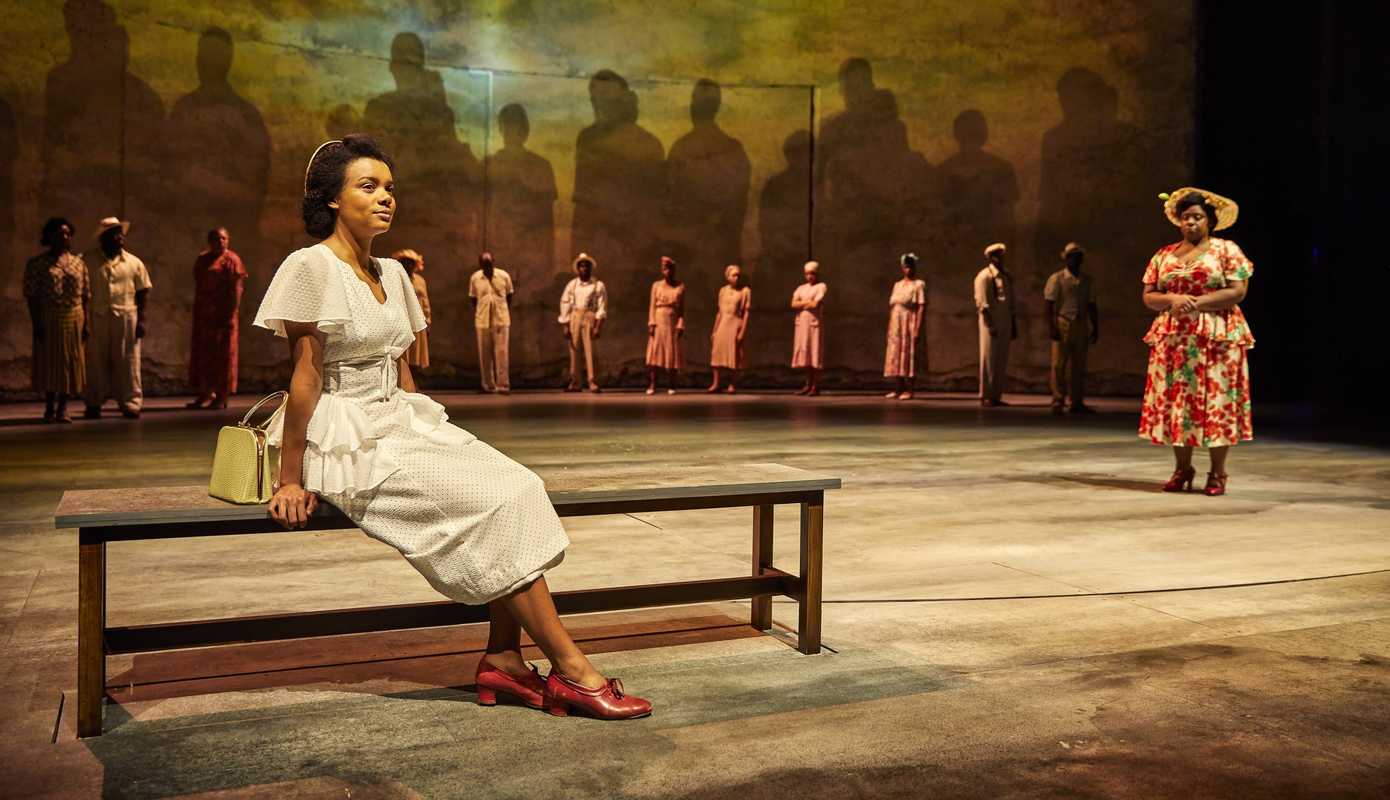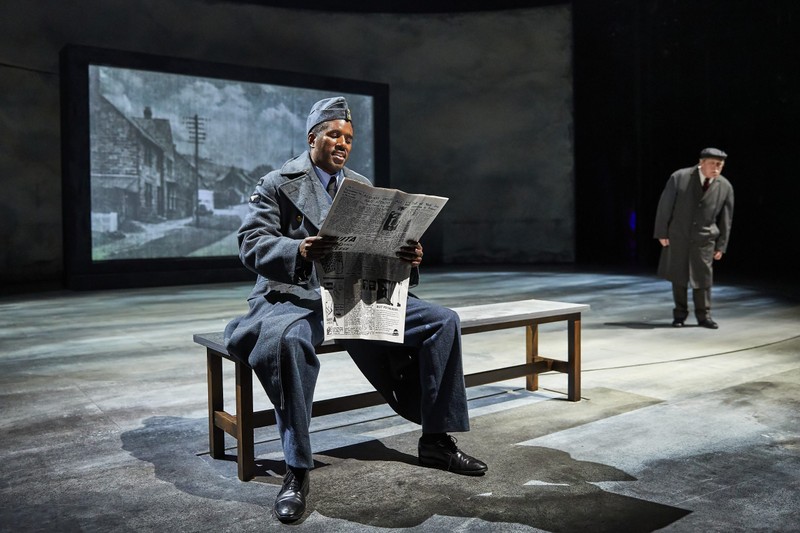Small Island, currently on at the National Theatre, is based on the seminal 2004 novel of the same name by Andrea Levy. Adapted for the stage by Helen Edmundson, the production retains much of Levy’s wit and rolling epic quality, while also diverging from the original to structurally elevate the story of Queenie, a white British landlady who houses protagonist Hortense and her husband Gilbert for a time. The result is a production that, while successful, has certainly received a divided reception. Some have been overwhelmed by the significance of Levy’s work on a main London stage, while others lament the ‘whitewashing’ of this opportunity to centre the Windrush generation. The relevance of Levy’s original work, with its keen and faithful focus on Black Jamaican immigrants in the late 40s, cannot be underestimated in this moment of horrific deportations and deliberate racial terrorism at the hands of the Conservative government.
Earlier this month, I caught up with three of the actors in the National’s production. Leah Harvey plays Hortense, the uptight protagonist who learns to soften, Gershwyn Eustache Jr plays Gilbert, her flawed but loving husband, and Shiloh Coke plays Celia Langley, her cheeky best friend whose place Leah takes on the ship out of Jamaica. Below they share their thoughts on the production, the importance of representing the Windrush generation on stage, and why they think art and creativity remains significant in moments of immense political and social threat.
What is the significance of performing in this adaptation at this moment for you?
Shiloh Coke: I couldn’t imagine a more accurate time for Small Island to be staged. Being a Black British woman of Jamaican and Grenadian heritage, it then feels even more significant to be a part of this production as many of those British citizens who have been wrongfully deported could be my mother, father, uncle or aunt. They are a reflection of my own family.
Gershwyn Eustache Jnr: The UK was on its knees back then, and these people were part of the Empire. When the Empire called you to help, you came to help. They took that very seriously and they sacrificed so much to come over here to set up new lives. They’ve now lived here for years, they came here to work hard and they have worked hard, paid their taxes and contributed so much to our society. None of this should be forgotten and that generation should be treated better than they have been.
Leah Harvey: The show had been in the works at the NT for years and everyone involved felt it was an important story to tell. We all feel a real energy in the room every night, which just shows [the story is] relevant. I think everyone can find something in it, even if it’s just one second, there’s something that applies to everyone.
What did you enjoy most about rehearsals?
GEJ: [I enjoyed] the challenge of coming up with a real life person on stage and not making it a caricature, the fun of creating a character that was my neighbour, dad, uncle, the challenge of taking what was in the book and then finding where I fit into the mix and what could I bring to that. We had two months of rehearsals so a good amount of time to really get to know the characters and the play.
SC: I enjoyed creating character backstories based on the shared experiences of our parents and grandparents, then seeing each other in costume for the first time. It felt nostalgic, although the memories aren’t necessarily our own.
LH: Being in the room with the different types of people [that make up] the cast, and seeing this piece of art come to life was most enjoyable for me. It was a big team (the cast is over 40 people) and we’ve really supported each other and got along so well.
Who do you hope comes out and see the play and why?
GEJ: Everybody! You don’t have to be British or Jamaican to take something from it. I think a lot of people’s family history involves travelling from another part of the globe in search of better opportunities. We’ve had really diverse audiences in (especially press night), and it’s important that that continues. There are so many rich cultures that make up London (and further), and I guess the more you see yourself represented on stage, the more you feel encouraged to come into theatres.
LH: I hope people who haven’t been to the theatre before come along and have this as their first experience of seeing a show. To be in the epic space that is the Olivier Theatre, and soak up the atmosphere, is incredible. I especially hope kids and teenagers come and see the show; I think it could have such a positive effect on them. I saw Coram Boy (by Helen Edmundson) when I was 12 and it was a huge moment for me. I’d love them to have that experience.
SC: I hope as many Caribbean elders come to watch Small Island as possible! Because it shows a shared experience, one that is partly their reality and history. How often is it that they’re able to see part of their experience staged? That being said, an organisation I co-run with actress Cherrelle Skeete, Blacktress UK, have partnered with the National to offer discounted tickets to 50 Caribbean Elders to come and watch a matinee performance of Small Island on August 3rd. So if anyone is interested in booking a ticket for a Caribbean elder they know – Contact hello@blacktress.co.uk
What do you think is the power of art and particularly theatre in this current political climate?
LH: In London theatres at the moment, there are stories on the stages that haven’t been told before, by people who haven’t had the platform to tell them. I think the impact that will have on younger generations is huge – it’s important for them to see their lives reflected in the culture and art around them and know there’s a place for them. As much as it’s about telling good stories and being entertaining, it’s also about moving things forward and continuing everything that we’re seeing now and not stopping. It’s a really exciting thing to be part of.
GEJ: creativity is so important, especially from a young age, and the fact that the arts are being cut in schools is worrying. Kids pick up so many things from so many different sources, and need outlets to express themselves and grow. The arts are just as important as subjects like maths and science, and can have such a positive influence when it comes to encouraging someone to think for themselves. We need creative minds to think of new ways to take us forward and progress.
SC: I think the power of art lies in its ability to question reality. The power of art encourages us to imagine, choose, and take action. “If you are neutral in situations of injustice, you have chosen the side of the oppressor” – Desmond Tutu. Artists and creatives may not be the law makers, but by creating art that challenges perspectives, the hope is that we can encourage the masses to become more empathetic.
Small Island is running at The National Theatre until 10th August. Get your tickets here. And don’t forget to email hello@blacktress.co.uk to book discounted tickets for Carribbean elders to the 3rd August matinee.





